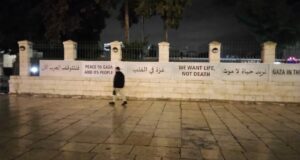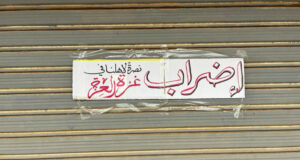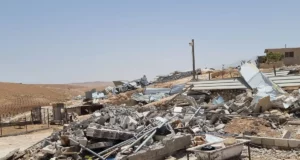Interview from community radio of RMIT university, Melbourne, Australia
A former RMIT University lecturer has become a volunteer peacekeeper on a Middle East frontline – at 75.
Mary Baxter, who lectured in statistics and mathematics from 1968 to 1996, is based in Tel Rumeida, a suburb of the Palestinian city of Hebron in the West Bank.
“My chief task is to get Palestinian children to and from school safely. Israeli settlers train their children to throw rocks and stones and often watch them doing this,” Ms Baxter said.
“The young Israeli soldiers stationed in the area are supposed to protect the Israeli settlers but it is the Palestinians who need protection.”
Ms Baxter pays her own way, working with International Solidarity, a Palestinian-led non-violent organisation. Her work involves collaboration, too, with Machsom Watch (Israeli mothers and grandmothers), Christian Peace Teams and the Ecumenical Accompaniment Program in Palestine and Israel.
“I work at getting the soldiers to see the Palestinians as people. It helps that I automatically like the soldiers and am able to separate who they are from what they do. They are very like the engineering students that I taught for 30 years at RMIT.”
Ms Baxter was the first permanent woman lecturer in a technological area at RMIT.
She told Openline: “In the early days, Brigadier Jackson (Principal of RMIT) would visit each department for morning tea. When he met me, he asked, ‘How do you manage classes who are all young men?’ My boss replied for me, ‘She has five sons’. The Brigadier then said to me, ‘I take the question back’.”
What made her take up her new and challenging role?
“A mixture of things. I know the area. I was in Jerusalem for an International Ecology Congress (Statistics section) in 1978. Then, again, with my husband Alan (who was an Anglican priest) in 1987 on a Melbourne Jewry-sponsored tour for Christian clergy. Alan did a locum in Damascus in 1988 and I joined him for two months.
“I was definitely bored in retirement. And I think it is a call from God. I am certainly healthier in Palestine, in spite of the danger, than in Melbourne.”
Are there signs of hope?
“Not much from governments. Israel says they will remove settlers but keep taking more land. Positive signs are that young Israelis come to help, as do overseas Jews.
“Also a lot of the soldiers are nice kids. Sometimes a soldier will say, ‘I’ll look after the children, Mary’. Then I don’t have to antagonise settlers by going so close to where they live.”
What are the signs that things are getting worse?
“There are more and more roadblocks. Just south of Hebron, the Israeli army is building a wall one metre high. As usual, they say it is for security. But people can get over it. Tractors and donkeys can’t. And, of course, it is right in the middle of Palestinian land.”
Are you fearful for your personal safety?
“Not really. I do get hurt at times but if the settlers really wanted me dead, I would be by now.
“I have five sons and 12 grandchildren who all agree that being in the West Bank suits me.”
 International Solidarity Movement Nonviolence. Justice. Freedom.
International Solidarity Movement Nonviolence. Justice. Freedom.


